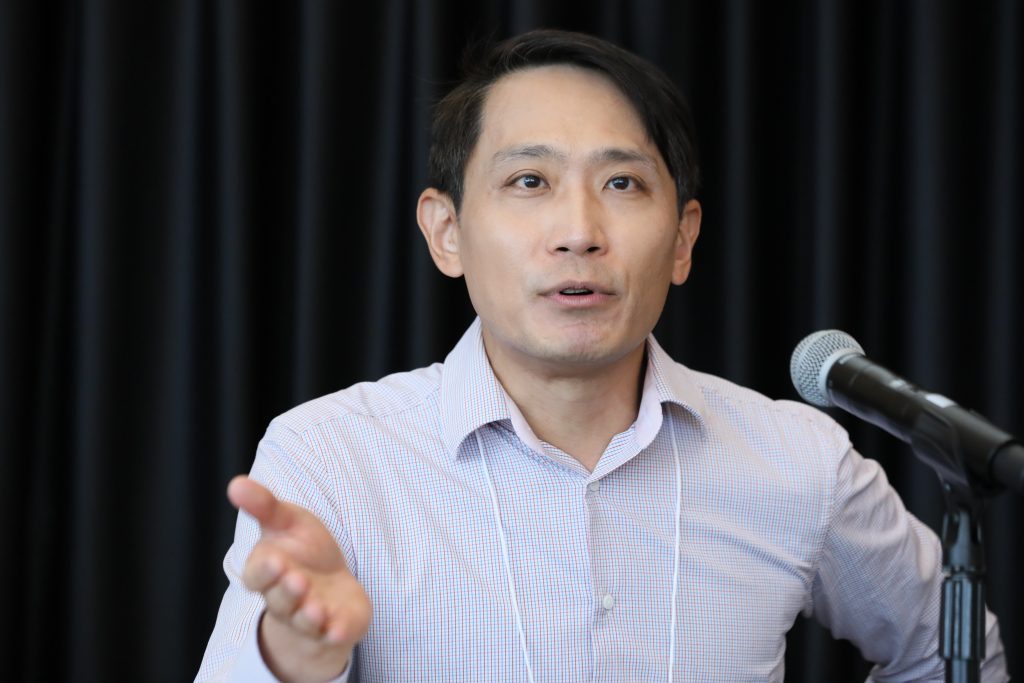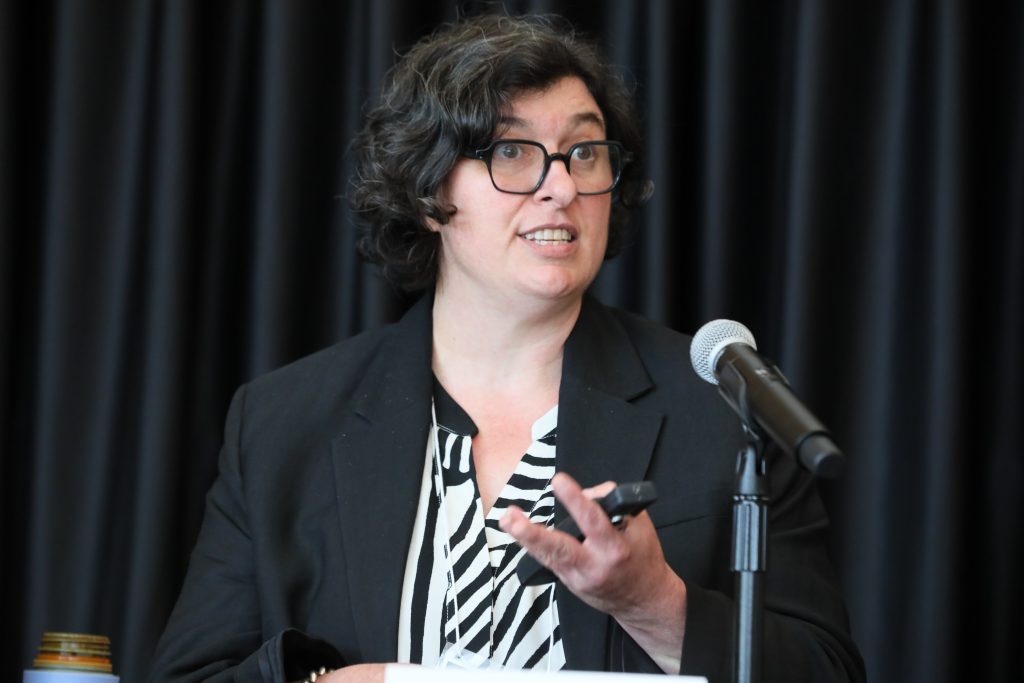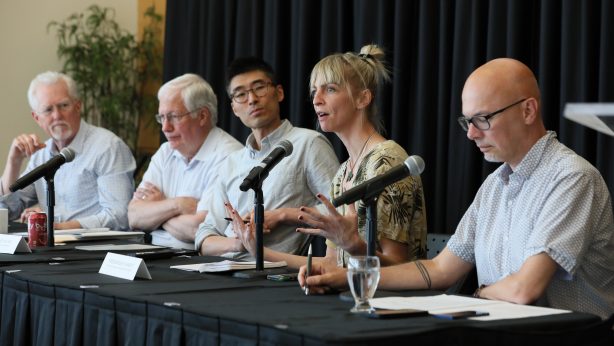What can rescue the Canada Health Act?
The 40th anniversary of the Canada Health Act has scholars revisiting the legislation and suggesting ways to make health care more universal, accessible and comprehensive.
At the Canada Health Act at 40 Research Roundtable on June 20 at the University of Ottawa, panelists Y.Y. Chen, Martha Paynter and Marie Carpentier discussed how to address some of the shortcomings of the Canada Health Act.
The panel is now available for viewing here –
Y.Y. Chen is an Associate Professor at the University of Ottawa’s Faculty of Law, Common Law Section. Chen is an expert of migrants’ right to health, social determinants of health, border control of infectious diseases, and medical tourism.

Chen made a case against the waiting period allowance in the Canada Health Act, especially for Canadians who are returning from a prolonged stay abroad as well as newcomers settling in Canada.
“These kind of waiting periods threaten their health and well-being and serve a legislative objective that I think is somewhat dubious,” argued Chen.
Chen explained that the Canada Health Act’s portability criteria permits provincial and territorial health insurance programs to put in place a waiting period so long as the length is no longer than three months. This allowance is then buttressed by another section of the Canada Health Act which defines insured persons as excluding residents who have not fulfilled the waiting period.
According to Chen, some provinces and territories do not impose any waiting period on new residents coming to their jurisdiction from abroad while others impose a waiting period on certain groups of returning residents and newcomers.
“To mitigate the harms or potential harms of the three-month waiting period and the possible human rights breaches, many provinces and territories that impose such a waiting period actively encourage new residents to take out private health insurance,” said Chen, noting the equity concerns around private health insurers not covering preexisting health conditions, including pregnancy and other reproductive health care.
Waiting periods are sometimes justified as way to combat so-called health tourism. Health tourism involves the idea that people come to Canada to take advantage of Canada’s health care system. For Chen, there is no concrete evidence to suggest health tourism is a significant concern in Canada.
Martha Paynter is Director of Nursing Research with the Contraception and Abortion Research Team at the University of British Columbia and an Assistant Professor at the University of New Brunswick Faculty of Nursing. She is the author of Abortion to Abolition: Reproductive Health and Justice in Canada (Fernwood).

Paynter traced the progress made on abortion care in Canada in the past 10 years while also noting that back in 1988, Canada was unique in the world as the only jurisdiction with complete decriminalization of abortion.
Paynter described how abortion care, once only the domain of physicians, is now more accessible with the introduction of medical abortions. More health care professionals such as nurse practitioners are now able to provide abortion services.
“Starting with New Brunswick, we had public funding for mifepristone. Here is a pill that you take at your house that the government pays for. You present your Medicare card at your community pharmacy and you go home,” said Paynter.
Paynter noted that later gestational duration abortions are still needed and there remains a need to train health care professionals in this service.
“There is a potential deskilling when you have massive expansion of mifepristone, of medication abortion. Way fewer people are doing procedural abortion, which you will always still need and if you aren’t doing enough of something, you will no longer be competent and we’ve seen in countries like Scotland and Sweden, where medication abortion is 95, 99 per cent, they are simply not able to offer this care anymore,” said Paynter.
While Paynter highlighted the reproductive health care wins, such as universal contraception in British Columbia, she noted, “We have also been experiencing increasing austerity and so what does it matter if you have medication to have your miscarriage at home, if you do not have a home? We really need to be thinking about the broader socioeconomic life of the abortion patient when we are thinking about violations of the Canada Health Act in this domain of care and really rethinking from that frame of reproductive justice.”
Paynter defined reproductive justice as a movement, a philosophy that grew out of Black American feminism. “It was coined in the 1990s but it theoretically has gone on forever in terms of black feminist thought and this really critiques a white feminist obsession with abortion to say not only do we need the right to not have a child but the right to have a child and to parent that child in safety and security in a safe home,” said Paynter who also described the need for better public transportation so everyone can access health care.
Marie Carpentier is a lecturer at various Quebec law faculties and was a legal counsel at the Commission des droits de la personne et des droits de la jeunesse for more than a dozen years. She currently works as a lawyer in the Legal Affairs Department of the Commission des normes, de l’équité, de la santé et de la sécurité du travail and is an associate researcher at COMRADES.

Carpentier spoke about how international human rights law can come to the rescue of the Canada Health Act. She described how a United Nations Special Rapporteur flagged an inaccurate assumption that the international human rights obligations of Canada are allegedly not legally binding. The Rapporteur made a few recommendations to help Canada comply with its human rights obligations and treat health care as a human right.
“The right to health does not appear anywhere in our laws in Canada but it is nonetheless guaranteed by many treaties signed by Canada,” said Carpentier.
Carpentier highlighted the case of Nell Toussaint, a woman who was denied timely access to health care because of her irregular immigration status.

Y.Y. Chen and the Canadian Health Coalition are part of efforts to seek justice for Toussaint and to continue her fight for health care for irregular migrants. Earlier this year, the Canadian Health Coalition and the Canadian Union of Public Employees (CUPE) honoured Toussaint at an all-party reception on Parliament Hill. For Black History Month, CUPE celebrated Toussaint and her struggle for universal health care with a poster that captured her fighting spirit.
Born in Grenada, Toussaint was raised in Trinidad. She moved to Canada in her twenties, and worked as a cleaner, a childcare provider and a factory worker. She was taken advantage of by unscrupulous immigration consultants which prevented her from regularizing her immigration status.
Irregular migrants in Canada don’t have access to public health care so when Toussaint became sick, she was denied access to health care. As her condition worsened, the harm she suffered became irreparable. Yet, neither her province nor the federal government would insure her. Not one to give up, Nell Toussaint took Canada to court with the claim that denying irregular migrants access to health care violates the Canadian Charter.
Toussaint took her fight all the way to the United Nations. A UN committee ruled that Canada violated her right to life, and asked Canada to grant health care to all irregular migrants. Canada has so far refused, and so her advocates and family members continue her legal struggle against Canada to force it to provide health care for irregular migrants.
This is the sixth blog of a series of eight weekly blogs summarizing what was heard at the Canada Health Act at 40 Research Roundtable at the University of Ottawa on June 20, 2024. The research roundtable was organized by the Canadian Health Coalition and the University of Ottawa’s Centre for Health Law, Policy and Ethics with support from St. Thomas University.
Next week’s blog will discuss the panel on public health care solutions with Action Canada’s Fréderique Chabot, Canadian Doctors for Medicare’s Edward Xie and Nova Scotia Health Coalition’s Dr. Robert Barkwell and Ian Johnson. Previous webinars can be watched on the Canadian Health Coalition’s Youtube channel.



